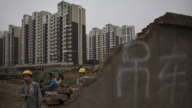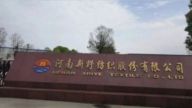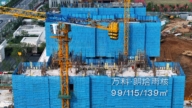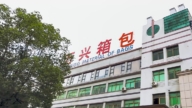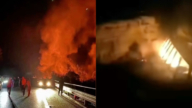【新唐人2013年08月22日讯】钢贸贷款风险在中国已经持续多年,许多银行身陷其中。中国钢贸企业至少三分之二位于上海,而上海钢贸企业的未偿贷款,去年底总计大约1,800亿元人民币。除了上海是重灾区之外,江苏最近也新增不良贷款182亿元,成为同期中国新增不良贷款最多的省份。
有专家认为,中国经济放缓,造成很多行业都存在产能过剩问题,其中包括钢铁。分析指出,这和中共当局主导的刺激经济政策有很大的关系。专家估计,未来将会曝光越来越多融资黑洞。
大陆《21世纪经济报导》最近了解到,江苏省有10名银行支行长,因为钢贸市场融资黑洞被撤职或追究法律责任,包括工商银行、建设银行、交通银行以及省内的江苏银行等,多家金融机构在内。
报导显示,江苏新增不良贷款在今年1-6月就达到了182亿元,其中钢贸市场是这些不良贷款的主要集中领域。
美国南卡罗莱纳大学艾肯商学院教授谢田:“同时有10家支行同时在参与,这对银行来说也是非常危险的,因为如果这个交易有风险,或者风险很大或破产的话,那等于同时把10家支行给带下去了,这是一件令人非常诧异的是中国这些融资平台,居然有那么多不为人知的内幕。”
经济评论家杰森:“钢材的产能过剩,随着中国经济的放缓,世界的需求下降或持平,中国的钢铁产能过剩只会越来越严重,最终就是银行当时贷的款收不回来,就成了坏帐。”
据了解,大陆钢贸市场采取多种加强担保方式,来符合银行的贷款要求。其中通过向钢材市场缴纳保证金,寻求钢材市场提供保证担保的“联保互保”融资模式,得到了银行的认可。
资料显示,钢贸行业从2000年开始采用“联保互保”的融资模式。到2009年这一融资模式达到顶峰。大批的钢贸商可以轻易的从银行那里获得抵押贷款,甚至重复抵押。2011年,中国钢材贸易贷款1.89万亿元,同期全国贷款总额54万亿元。钢材贸易贷款在整个银行贷款中的比例高达3.5%。
杰森:“实际上这都是中共中央对于GDP的饥渴,高GDP饥渴的一种展现,但是这个过程中,却出现了一些利益集团之间的博奕,比如地方政府的利益,在一定层面上和中央政府的利益,就出现了分裂,那么这几个银行行长,就成了一个利益集团之间博弈的牺牲品。”
《21世纪经济报导》显示,截至今年上半年,江苏钢贸市场不良贷款余额为213亿元,不良贷款率为42.3%,较年初上升23.3个百分点,而江苏5家大型银行上半年新增不良贷款中,钢贸贷款就占了55.8%。
中共国家审计署7月28号发表公告声称,已经开始组织全国审计机关对政府性债务进行审计。
美国南卡罗莱纳大学艾肯商学院教授谢田估计,未来几个月,可能会有更多的融资黑洞
被曝光出来。
谢田:“一旦追查到融资平台的时候,类似这种风险极大或者是没有足够的担保、不符合程序,和涉及到行贿受贿,所有这些不法违规的现象,可能都会一一暴露出来。我想现在各省市县那些地方政府,涉及融资平台的人员,很可能现在紧锣密鼓的在准备后事了,甚至准备逃跑都有可能。”
根据上海一名钢贸商负责人透露,现在有不少钢贸老板跑路了,抵押物也不要。因为现在钢材价格跌到谷底,贷款又已经拿到,钢材就留给银行处理。何况,这些钢贸商的一批货物被反复抵押不知道有多少次了。
采访/陈汉 编辑/黄亿美
Disasters from China’s Hunger for GDP
Many banks in China are trapped in risky loans to
the steel trade industry.
At least two third of China’s steel trade industry
is located in Shanghai.
In 2012, the hardest hitting year, outstanding loans to the
steel industry in Shanghai reached a total of 180 billion yuan.
In addition to Shanghai, Jiangsu’s new non-performing loans
(NPL) recently reached 18.2 billion yuan, and Jiangsu became
the province with the largest new NPL.
Some experts believe that China’s economic slowdown
has resulted in overcapacity in many industries, including steel.
Analysis pointed out it had a lot to do with the economic
stimulus policies of the Chinese Communist Party (CCP.)
Experts estimate that more financial black holes
will be exposed in the near future.
Mainland’s 21st Century Economic Report recently showed
10 bank directors in Jiangsu Province have been removed
or held legally responsible over steel trade financial
black holes, including those at the Industrial and Commercial
Bank of China, Construction Bank, Bank of Communications
and Bank of Jiangsu province.
Reports indicate that during the first 6 months of 2013,
Jiangsu new NPL reached 18.2 billion yuan.
Of these, the bad loans from the steel trade market
were the main focus.
Professor Xie Tian, Aiken School of Business, University
of South Carolina: “Simultaneous involvement of 10 banks
is very dangerous for the banking industry.
If anything or bankruptcy should happen, 10 banks
will go down together.
I am very surprised to learn of these unknown stories."
Economic commentator Jason Ma: “With the slowdown
in China’s economy and declining world demand,
steel overcapacity in China will only be worsened.
Ultimately, bank loans cannot be paid back
and turn into bad debts."
It is understood that the Mainland China steel market uses
multiple protection models to meet the banks’ lending requirements.
By paying a deposit to the steel market, steel merchants
can obtain the steel market’s mutual protection, which has been recognized by banks.
Statistics show that the steel trade industry began
to use mutual protection since 2000.
Many steel enterprises can easily obtain loans from
banks in this case.
In 2011, China’s steel trade loans were 1.89 trillion,
which was 3.5% of the total national loans of 54 trillion yuan.
Jason Ma: “In fact, this is the manifestation of the CCP’s
hunger for GDP.
During this process, many interested groups fought
for profits, such as the central government against
local governments, and conflicts followed.
These dismissed bankers unfortunately became victims."
21st Century Economic Report shows that during the first
six months of 2013, NPL of Jiangsu steel trade market
amounted to 21.3 billion yuan.
NPL ratio was 42.3%, up 23.3 percent compared with
the beginning of 2013.
Among the five largest banks in Jiangsu, NPL’s
from the steel trade market accounted for 55.8%.
On July 28, the National Audit Office announced that it had
already started to organize a national audit of government debt.
Professor Xie Tian estimates that many financial black holes
will be exposed in the coming months.
Xie Tian: “Regarding finance, taking a great risk or lack
of adequate security goes against lending procedures
and may involve administrative bribery.
All these violations may be exposed.
I believe people who are involved with finance
in local governments are preparing for the worst.
Many of them may be ready to flee."
According to a responsible person in Shanghai’s steel trade,
many bosses in the steel industry have already walked away,
leaving their collateral behind.
Right now, steel prices have hit bottom.
Since they have the loans in their hands, they leave
their steel goods to the bank to deal with.
Some steel goods have been repeatedly used
as collateral several times.


